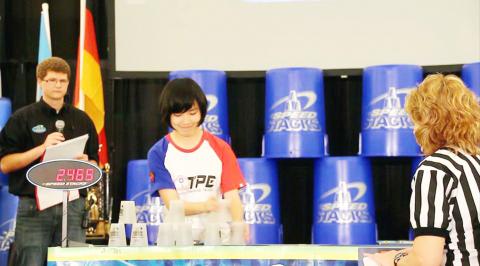Though sport stacking may not be a popular sport in Taiwan, 16-year-old Lin Meng-hsin (林孟欣) has made it a vehicle through which to showcase the nation to the international community.
Sport stacking is an individual and team sport that consists of stacking plastic cups in specific sequences as quickly as possible. The sequences are usually pyramids of three, six or 10 cups.
Lin began attracting attention when she appeared in a YouTube video practicing sport stacking in various locations around the nation. Lin said she got the idea for the film from video clips posted online by two brothers.

Photo courtesy of the World Sport Stack Association
The brothers had made a lot of extreme sports videos while they were in Taiwan, Lin said, adding that she had been impressed with the quality of the footage in the clips and their seamless editing.
After contacting the brothers and enlisting their help, Lin and her teammates decided to film in iconic spots, such as Taipei 101, the Shilin Night Market and the Ximending (西門町) area in Taipei.
Their video, titled Taiwan’s Fastest Cup Stackers, was aimed at introducing Taiwan to the sport stacking community, Lin said, adding that if she makes another video, she wants to film it on Yushan (玉山).
In addition to being uploaded onto YouTube, the video was also shown at an exchange between competitors in this year’s World Sport Stacking Association’s Championships, which were held in Orlando, Florida, on April 6 and April 7.
Lin and her teammates also prepared a neo-techno version of the traditional dance for Taoist deity San Taizi (三太子), which is traditionally performed at religious gatherings, and brought a world map to point out Taiwan’s location.
“Taiwan may be a small country on the map, but for those born and bred on Taiwan, it’s as large as any other country,” Lin said.
At the championships, the Taiwanese team won two gold medals, seven silver and five bronze.
Lin, one of the gold medalists, said that she surprised herself by stacking nine cups in 1.915 seconds, adding that she had been unable to break 2.15 seconds since her first competition in 2011.
However, Lin’s success comes at a price: Practicing two hours a day has caused the tendons in her arms to become inflamed and one of her hands to shake uncontrollably.
The team’s success in Florida seems to have sparked a national trend. After the event, the Chunghua Sport Stacking Promotion Association was established to promote the sport and about 60 people have dedicated themselves to perfecting their skills.
The association is hoping to host the Asian Sport Stacking Championships in New Taipei City (新北市) next year.
Most of the individuals currently practicing sport stacking are between seven and 16 years old because younger people tend to have faster reflexes than older ones.
Lin said there was no particular technique or shortcut that one can take to get good at sport stacking.
“All you needs is a set of cups that you are accustomed to using and lots of practice,” Lin said.
“The more you practice, the quicker your hand-eye coordination is going to be,” she said, adding that practicing cup-stacking can boost a person’s cerebral development and help them develop faster reflexes.

Three batches of banana sauce imported from the Philippines were intercepted at the border after they were found to contain the banned industrial dye Orange G, the Food and Drug Administration (FDA) said yesterday. From today through Sept. 2 next year, all seasoning sauces from the Philippines are to be subject to the FDA’s strictest border inspection, meaning 100 percent testing for illegal dyes before entry is allowed, it said in a statement. Orange G is an industrial coloring agent that is not permitted for food use in Taiwan or internationally, said Cheng Wei-chih (鄭維智), head of the FDA’s Northern Center for

The Chinese military has built landing bridge ships designed to expand its amphibious options for a potential assault on Taiwan, but their combat effectiveness is limited due to their high vulnerability, a defense expert said in an analysis published on Monday. Shen Ming-shih (沈明室), a research fellow at the Institute for National Defense and Security Research, said that the deployment of such vessels as part of the Chinese People’s Liberation Army (PLA) Navy’s East Sea Fleet signals a strong focus on Taiwan. However, the ships are highly vulnerable to precision strikes, which means they could be destroyed before they achieve their intended

LOOKING NORTH: The base would enhance the military’s awareness of activities in the Bashi Channel, which China Coast Guard ships have been frequenting, an expert said The Philippine Navy on Thursday last week inaugurated a forward operating base in the country’s northern most province of Batanes, which at 185km from Taiwan would be strategically important in a military conflict in the Taiwan Strait. The Philippine Daily Inquirer quoted Northern Luzon Command Commander Lieutenant General Fernyl Buca as saying that the base in Mahatao would bolster the country’s northern defenses and response capabilities. The base is also a response to the “irregular presence this month of armed” of China Coast Guard vessels frequenting the Bashi Channel in the Luzon Strait just south of Taiwan, the paper reported, citing a

About 4.2 million tourist arrivals were recorded in the first half of this year, a 10 percent increase from the same period last year, the Tourism Administration said yesterday. The growth continues to be consistent, with the fourth quarter of this year expected to be the peak in Taiwan, the agency said, adding that it plans to promote Taiwan overseas via partnerships and major events. From January to June, 9.14 million international departures were recorded from Taiwan, an 11 percent increase from the same period last year, with 3.3 million headed for Japan, 1.52 million for China and 832,962 to South Korea,